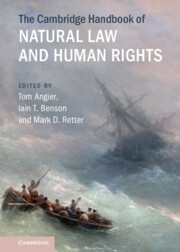Book contents
- The Cambridge Handbook of Natural Law and Human Rights
- The Cambridge Handbook of Natural Law and Human Rights
- Copyright page
- Contents
- Contributors
- Acknowledgements
- Introduction
- Part I Natural Law and the Origins of Human Rights
- Part II Natural Law Foundations of Human Rights Obligations
- Part III Natural Law and Human Rights within Religious Traditions
- Part IV The Human Person, Political Community, and Rule of Law
- 18 Human Dignity and Natural Law
- 19 Civic Friendship, Natural Law, and Natural Rights
- 20 Common Goods, Group Rights, and Human Rights
- 21 Natural Law, Human Rights, and the Separation of Powers
- 22 Human Goods and Human Rights Law
- 23 Natural Law, Human Rights, and Jus Cogens
- Part V Rival Interpretations and Interpretive Principles
- Part VI Challenges and Future Prospects
- Index
19 - Civic Friendship, Natural Law, and Natural Rights
from Part IV - The Human Person, Political Community, and Rule of Law
Published online by Cambridge University Press: 03 November 2022
- The Cambridge Handbook of Natural Law and Human Rights
- The Cambridge Handbook of Natural Law and Human Rights
- Copyright page
- Contents
- Contributors
- Acknowledgements
- Introduction
- Part I Natural Law and the Origins of Human Rights
- Part II Natural Law Foundations of Human Rights Obligations
- Part III Natural Law and Human Rights within Religious Traditions
- Part IV The Human Person, Political Community, and Rule of Law
- 18 Human Dignity and Natural Law
- 19 Civic Friendship, Natural Law, and Natural Rights
- 20 Common Goods, Group Rights, and Human Rights
- 21 Natural Law, Human Rights, and the Separation of Powers
- 22 Human Goods and Human Rights Law
- 23 Natural Law, Human Rights, and Jus Cogens
- Part V Rival Interpretations and Interpretive Principles
- Part VI Challenges and Future Prospects
- Index
Summary
This essay demonstrates the relationship between rights, natural law, and civic friendship by showing how the latter, the aim of law according to classic natural law theory, cultivates a culture of care for the other for one’s own sake, which is the basis of rights protections. It considers these connections in the teachings of key contributors to the classic natural law tradition, Aristotle and Aquinas, and engages their ideas with how rights are understood in modern liberal theory. The focus on the good regime of civic friendship responds to some contemporary concerns over the abstractness of human rights. While rights protections exist because the virtue of human beings cannot be depended upon, they still depend upon a standard of civic friendship that habituates citizens into regarding others as having absolute worth which finds its experiential origins in friendship.
Keywords
- Type
- Chapter
- Information
- The Cambridge Handbook of Natural Law and Human Rights , pp. 276 - 290Publisher: Cambridge University PressPrint publication year: 2022

